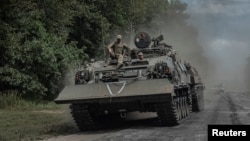On October 10, the Kremlin recalled its ambassador to the United States Anatoly Antonov, a veteran diplomat who led the Russian mission for the last seven years.
Antonov left Washington the next day after telling Newsweek that the U.S. should take seriously President Vladimir Putin’s threats of nuclear response for continued support to Ukraine.
Just three days earlier on October 7, Antonov’s boss, Russian Foreign Minister Sergey Lavrov told Newsweek that the U.S. and NATO allies are “playing with fire” by aiding Ukraine and may face “dangerous consequences” from Moscow.
Lavrov also claimed that Ukrainian authorities disregard the lives of their citizens and force them to fight against Russia.
“[Ukrainians] are ruthlessly pushed by their own authorities to the war to be slaughtered there.”
The claim is false.
The opinion polls, conducted by various sociological research centers, show that Ukrainians overwhelmingly support defending their country from the Russian aggression until victory.
A February 2024 survey by the "Rating" group shows that more than 60% of Ukrainians approve of President Zelenskyy's work, though support has declined from 90% at the start of the war. About 88% of Ukrainians say they believe in victory over Russia, and 45% expect that Ukraine will regain all of its 1991 territories.
A survey conducted by the Ukrainian NGO "Advanced Legal Initiatives" on March 22-24 found that most Ukrainians view "complete victory" for Ukraine as the most acceptable way to end the war.
Some 61.21% of Ukrainians chose the answer: "We fight until complete victory - restoration of territorial integrity within the borders of 1991, joining the EU and NATO." At the same time, only 38.79% of Ukrainians leaned toward the option: "We immediately begin peace talks with a complete bilateral cease-fire."
According to a survey conducted by the Kyiv International Institute of Sociology, 81% of Ukrainians believe that Ukraine, with the support of its allies, can achieve success in the war unleashed by Russia. The public opinion survey was conducted from September 20 to October 3, 2024.
Contrary to Lavrov’s claim, there is much independently gathered evidence that not Ukraine, but Russia routinely sends untrained and ill-equipped recruits to the war.
The U.S. said on October 10, that September was “the deadliest month” for Russia since Moscow’s troops first stormed Kyiv in 2022. The U.S. assessed that Russia suffered 615,000 casualties, with about 115,000 killed and 500,000 wounded.
Ukrainian losses almost halve those of Russia. Per U.S. estimates, about 57,000 Ukrainians have been killed and 250,000 wounded.
Ukraine said in October, over 664,000 Russian soldiers have been killed or wounded since the invasion began in 2022.
Western sources, including U.S. intelligence, suggest that poor planning, outdated tactics, uneven training of individual commanders and logistical issues are the key to disproportionately higher Russian losses. In contrast, Ukrainian forces, benefiting from Western military aid and local support, are better organized, contributing to their lower casualty rates.
In December 2023, Reuters, citing a U.S. official source, reported that high "losses are the reason Russia has loosened recruitment standards for deployment in Ukraine."
Many sources, including Western intelligence and interviews with Russian soldiers, suggest that Moscow’s forces are inadequately trained, poorly equipped, and sent into combat with little support.
Another key difference in valuing human life is evident in Ukrainian government's efforts to swiftly exchange prisoners with Russia, prioritizing its citizens' lives. In contrast, Moscow often delays or refuses prisoner exchanges.
In May 2024, Deputy Minister of Justice of Ukraine Elena Vysotska said that Ukraine is building new camps for Russian military prisoners of war, with the existing three institutions running out of space, as Russia is in no hurry to bring its soldiers home.
In September 2024, Chechen special forces commander and deputy head of the Main Military-Political Directorate of the Russian army Apti Alaudinov stated he would not rescue Chechen soldiers who surrendered during Ukraine's offensive in the Kursk region.
He declared that only those captured because of severe injuries deserve help, while those who surrendered without resistance "do not deserve to live."





